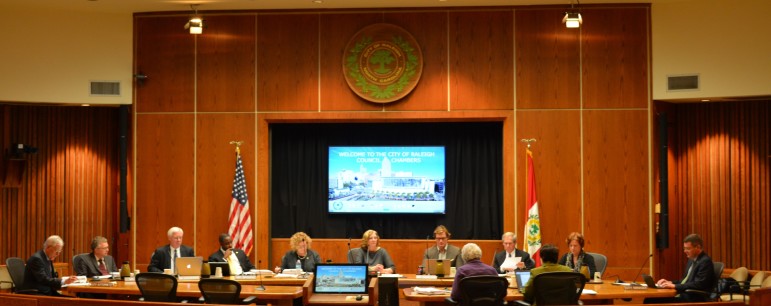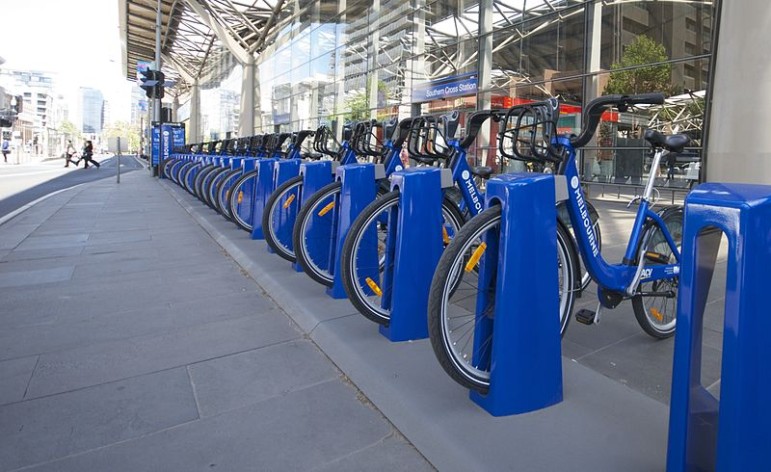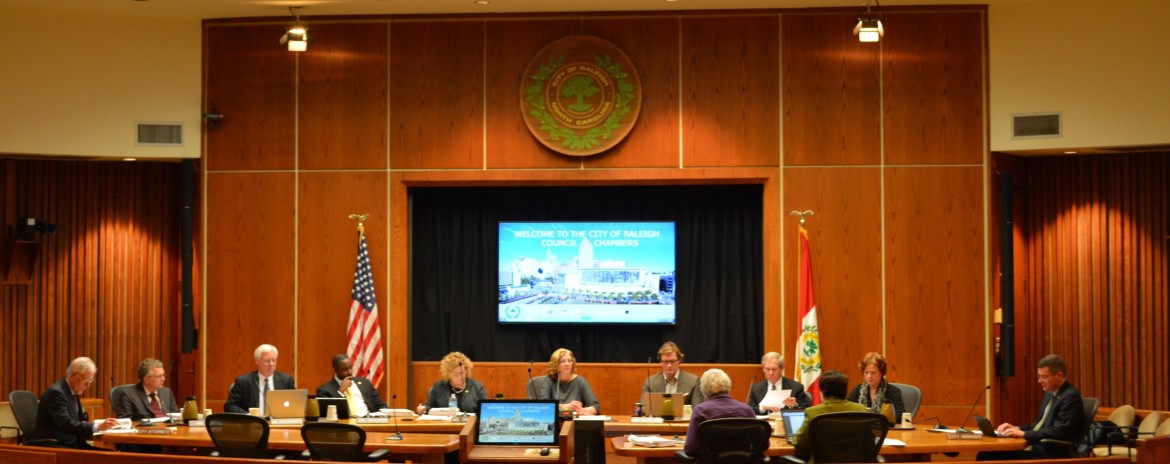Last week, we previewed what would be coming up at City Council with our Agenda Preview, an in-depth look at the issues scheduled for discussion before council. Today, we bring you The Council Record, an informal but nevertheless comprehensive look at the most recent City Council meeting.

February 16, 2016
As always, the Raleigh City Council meeting last week began with an invocation, led this time by Revered John L. Saxton, who managed to work in the City’s “work-live-play” mantra, and the Pledge of Allegiance, led by Councilor Dickie Thompson. Councilor Mary Ann Baldwin was absent and excused from the meeting.
Presentations & Awards
Two representatives from the Tammy Lynn Center for Early Childhood Development were on hand to thank the City for their continued support and to provide an update on the center’s mission.
Sara Hansen, the Director of Education for the Tammy Lynn Center, said the organization is “growing wonderfully with your support,” and that they were on track to double their capacity this year.
“A lot of that growth is due to being able to hire additional consultants,” including many who are bilingual. Of the 68 percent of the students in the program who are residents of Raleigh, Hansen said, half are bilingual.
“We went from just a couple years ago serving zero bilingual students to now serving a nearly 50 percent bilingual audience.”
Consent Agenda
Two items were pulled from the Consent Agenda this week: Item 5.1, a design contract for the New Bern Sidewalk project and Item 7.4, an encroachment request from Google Fiber.
Councilor Cory Branch had requested that 5.1 be pulled; he simply wanted to thank staff for moving this “great project” forward.
Councilor Daid Cox had requested 7.4 to be pulled. He said while he was excited that Google Fiber was coming to Raleigh, he was concerned about the huts being installed, saying they needed better landscaping and design, and noting that he’d fielded several calls on one installed at North Hills Park.
Cox requested that Google also reconsider the chain-link fences, which he said did not provide a high degree of security and were something of an eyesore. Council approved the encroachment request on the condition that staff take these concerns to Google.
Report & Recommendations of the Planning Commission
The only case to come out of Planning Commission for Council consideration last week was case Z-41-15. It would rezone a portion of the 3100 block of Hillsborough Street to allow for a five-story neighborhood mixed-use redevelopment. Commissioners recommended the project for approval, suggested that Council request that the applicant add a condition regarding public access to a proposed open space on Rosemary. Councilors took up this recommendation and the Public Hearing was then scheduled for March 1, 2016.
Report of the City Manager
The first item on the City Manager’s report dealt with the Poole Road sidewalk project, for which staff was seeking permission to move forward on. No citizen complaints or comments were received and Commissioner Branch requested that staff provide updates on the project to the local Citizens Advisory Council. Councilors authorized the project to proceed.

Wikimedia Commons
A bike station in Melbourne, Australia
Next up was a lengthy presentation on the City’s proposed BikeShare program from Transportation Director Eric Lamb.
“Traditionally bikeshare systems are kiosk-based automated self-service bike rental systems,” Lamb explained.
“We’re trying to encourage a system that has point-to-point station-to-station trips. Typically people buy memberships, whether annual or daily.”
In 2009, bikeshare was introduced as an action item in the 2030 Comprehensive Plan and in 2013 Council approved the selection of Toole Design Group to develop a feasibility study and implementation plan. In 2014, TDG determined that such a system was feasible in Raleigh, and proposed an implementation plan. In 2015, it was not included in the Fiscal Year 2016 budget.
Lamb said the initial roll out plan would include 30 stations at a total capital cost of around $2 million, which would be covered by a Congestion Mitigation & Air Quality Grant offered through the Capital Area Metropolitan Organization. In order to receive this grant, however, the city would have to allocate $425,000 in matching funds.
In addition to the $2 million capital outlay grant, the City would also be eligible for a $125,000 grant covering the design and planning of the system.
Lamb said the projected annual cost of operation was around $653,000, $215,000 of which would be recovered through user fees. The City would be responsible for the additional $438,000.
The initial plan, Lamb said, would be “relatively compact” and centered around downtown and NC State. Stations would also be put in place at Meredith College, Peace College, St. Augustine’s Unviersity and Shaw University. Although no commitments have been made at this time, Councilors asked staff to look into financial partnerships with these universities to help offset the cost of the stations.
Mayor McFarlane said that 30 stations seemed like a lot for an initial rollout, but Lamb explained that if they were to reduce the number to 20, the costs would not go down by a third due to an economy of scale. Most of the costs of maintaining the system, Lamb said, would involve physically relocating bikes from station to station and making sure they were all in good working order, costs which would not be reduced significantly if there were less stations.
Councilor Thompson noted that helmets did not appear to be a part of the system; Lamb said the logistics of a helmet rental system combined with the lack of a helmet law in North Carolina for riders over 16 meant it was not something staff had looked into.
Thompson also pointed out that it would cost a family of four approximately $50 to rent bikes for an hour, a rate he deemed a bit high. He wanted to know whether this was a system that could be privately run.
The only two fully privatized bikeshare systems in the country, Lamb said, were in New York City and Miami Beach, two cities which have a much heavier tourist trade than Raleigh. And while the system will be designed to accommodate and incorporate recreational trips, Lamb said the main goal is to offset short-distance car trips.
Councilor Cox expressed concerns over the long-term financial prospects of such a system, and asked whether they could generate additional revenue by dedicating “recreation-only” stations along Raleigh’s greenway system.
Lamb said because one of the main goals of the system is to link all the stations together, having separate, recreation-only stations would be difficult to maintain and incorporate into the larger overall system. One of the planned stations, however, is at the Art Museum, one of the locations Cox suggested.
Cox also asked whether new bike racks would be installed as part of the rollout, but Lamb said the goal was to encourage short-term rentals, and that the costs a user would incur by locking it up while the meter is running would likely discourage such behavior.
Councilor Branch asked about the community engagement process for planning the system, which Lamb said involved a few public meetings and an online campaign.
Next to speak was Councilor Kay Crowder, who pointed out that the bikeshare system in Seattle recently went into default, and the city was asked to decide whether it would spend $1.4 million to get the system out of debt. As far as Raleigh’s transportation goals, Crowder said it seemed as if a bikeshare system was something that should be further down the road.
“I love all the pretty pictures of where it works and how well it could work, but in the areas that it doesn’t work, what are the failures and how would we avoid those? I’ll be honest — I love bikeshare, I love biking, I don’t want city to be in the bike business.”
The City, Crowder said, should continue to concern itself with infrastructure upgrades and removing obstacles in the way of biking in Raleigh rather than providing a bikeshare system.
Finally, Councilor Russ Stephenson reminded everyone that there was a time limit for the city to decide on whether they should move forward or not; if they wait too long, the $2 million infrastructure grant goes away.
Lamb said they had set a deadline of April 1 so they could let CAMPO know, which would allow it to allocate the money to another organization in the region instead of sending it back to the federal government.
Council’s questions were followed by a presentation from Wake County Commissioner and Raleigh resident Sig Hutchinson, who after a brief talk presented a poem he had written specifically for the occasion titled “BikeShare.”
The full lyrics, along with two remixes — hey writing about City Council week in and week out can get a little dry — can be found below.
BikeShare: By Sig Hutchinson
Any way you slice it, bikeshare is fun; it’s good if you’ve got lots of time or even on the run. Think of your favorite city, the ones we all like to go, bikeshare is there, ready for you to go to and fro.
70 cities in American are currently in the plan; the ones you expect, like DC and Boston, San Diego & San Fran — but there are other cities doing bikeshare that you think might would pass: there’s Oklahoma City, Spartanburg, Omaha and Charlotte, who are all kicking our…butts.
BikeShare is good for tourists it’s good for citizens too, it’s good for our brand and the health of both me and you. It’s good for first-timers giving bikeshare a try; someday they might even say ‘A bike I will buy!’
It’s good for those who use it every day; for them it’s like play, grabbing a latte along the way. You can save money, it can make you smile, you can ride with a friend if you take transit it can take you, your last mile. It’s great for millennials and seniors too, for me and you, I think it will do.
The plan is a buzz; everyone thinks so: from Wake Up! Wake County to to Advocates & Health in Action, everyone’s saying: Go!
From the transportation folks like RTA and Joe, to the Downtown Raleigh Alliance saying ‘We’ll handle the operations, so please give us some mo’!”
From millennials to urbanites and serving downtown, Matthew Tomasulo says ‘I’m down with downtown!’ So bring it around, we all love bikeshare and now it’s one vote away, it’s making Raleigh cool; let’s make it happen today!”
Following Hutchinson’s presentation, Mayor McFarlane asked if he had brought along the county checkbook.
“Working on that!” joked Hutchinson.
Councilor Bonner Gaylord told Councilors he had been working to raise private dollars for the system, and after three phone calls had received a verbal commitment of $250,000 a year for the next three years.
Gaylord’s point was emphasized by the next two speakers: a representative from Citrix and a representative from Rex Healthcare both spoke in favor of the system and expressed a strong interest in being included in future sponsorship plans.
David Diaz from the Downtown Raleigh Alliance said his organization would be conducive to a partnership with the City where they handled maintenance of the system once it was put in place, similar to what’s being done in Charlotte. Lamb had stated that public-private and public-non-profit partnerships are both ways in which the program could be managed.
Following some further discussion, Councilors decided they would take up the bikeshare issue again in their March 15 work session.
Requests and Petitions of Citizens
Note: the first speaker signed up for a citizen petition was Sig Hutchinson, who used his time during the bikeshare presentation.
Next up was Neil Rieman from the Cameron Park Neighborhood Association, who wanted to request a text change for alley transitions that would allow residential developments to be built right up to the edge of the property. The existing code mandates that a parking lot or outbuilding occupy this space in order to provide a transition, a setup that was nor particularly friendly to development in the area.
Councilors agreed to send the text change to Planning Commission for further review.
Rieman was followed by Jona Marie Ricci, who detailed for Council a number of problems she was having with a city-led repair project at her home. At present, she said, she was without a working kitchen and lacking a number of other amenities, and work on the job had been stopped without presenting her with an option to seek out her own contractor.
Councilors directed the City Manager Ruffin Hall to prepare a report on the issue and bring it back for further review.
“Sorry I didn’t write a poem for you,” Ricci quipped.
The final speaker was Lisa Rowe, who works for PLM Families together, which offers housing solutions for families experiencing homelessness. She wanted to request that the City pave a gravel road off New Bern where some of their housing is located. The gravel, she said, is difficult for the residents to walk on and in bad weather can be extremely hazardous.
Mayor McFarlane expressed surprise that such a road even existed within Raleigh, and Councilor Branch pointed out there was a total of 5-6 miles of unpaved roads throughout the City.
City Manager Hall said Councilors would need to look into its current road repaving policy, and noted that there was currently no funding for this particular project. Money could be allocated from elsewhere should Council move forward with the project.
Staff was instructed to put together a report on the possibility of paving the road and bring it back to Council.
Public Hearings
The first item scheduled for public hearing dealt with future plans for the service providers in the downtown and Hillsborough Street municipal districts. Staff will eventually be putting out requests for proposals for new providers, although the ones currently in place, the Downtown Raleigh Alliance and the Hillsborough Street Community Services Corporation, will also be eligible to reapply.
Anne Franklin from the Downtown Living Advocates group was on hand to discuss the future of the service districts. Franklin said while they would like most of the same services to be provided as part of any future contract, they wanted more diversity on the board of the Downtown Raleigh Alliance. The DRA, Franklin said, should include more local business owners — who make up only 10 percent of the board — and downtown residents, who only make up 3 percent of the board.
Councilor Stephenson said whatever organizations are selected to run the districts should have to formally acknowledge and work with the City’s adopted long-term plans for development.
After noting that both Stephenson and Franklin’s concerns had already been incorporated into the RFP planning process, Council directed staff to move forward with drafting the proposal.
Next up for public hearing was rezoning case Z-44-15, which would allow for the expansion of the Triangle Orthopaedics Surgery Center in Brier Creek on ACC Boulevard. Councilors agreed unanimously to approve the case.
The final matter to be discussed last week was another rezoning case, Z-45-15, which would allow for denser residential development off Poole Road. The applicant, Community Alternatives for Supportive Abodes, works to provide affordable housing to low-income residents of Raleigh. Once approved, the rezoning would allow the number of units on the property to increase from 29 to 101.
Several Councilors, including Branch and Thompson, expressed concerns over the possible traffic impact this would have. Although the nature of the project meant a traffic study was not required for approval from staff, Council was free to request one. After several minutes of back and forth discussion over the costs of such a study — they can run around $10,000 — it was eventually decided to approve the case with the condition that such a study be conducted at the site plan phase. The applicant had stated they would not have been able to move forward with the project if a study was required at this point. Staff estimated a total increase of about 450 trips per day.
Councilor Thompson voted against the project, noting that the City seemed to be unevenly applying a requirement for traffic studies, noting they had recently required one for a development smaller than the one proposed on Poole Road.
Individual Councilor Reports
Councilor Cox brought up two issues in his report: the possibility of adding flags to light poles, and the issue of tractor trailers being parked on City streets.
Mayor McFarlane noted that the flag issue was something that had come up before, and was a complicated matter and not something she could ultimately see herself supporting. Councilor Crowder expressed similar concerns, saying “let’s be cautious of visual clutter in Raleigh.”
Cox requested a report from staff on the issue.
Councilor Crowder announced that a second bridge was out in District D, within a half-mile of another bridge that was out. “I’d like to remind constituents that we could have as many as fie bridges out at the same time,” she noted.
Although not part of the Councilor Reports, City Attorney Thomas McCormick informed Council that the issue over the so called “Modern Oakwood” house had been resolved by state courts, and that the house was approved for development. Although there are still options for appeal, McCormick said the chances of them succeeding were very slim.
